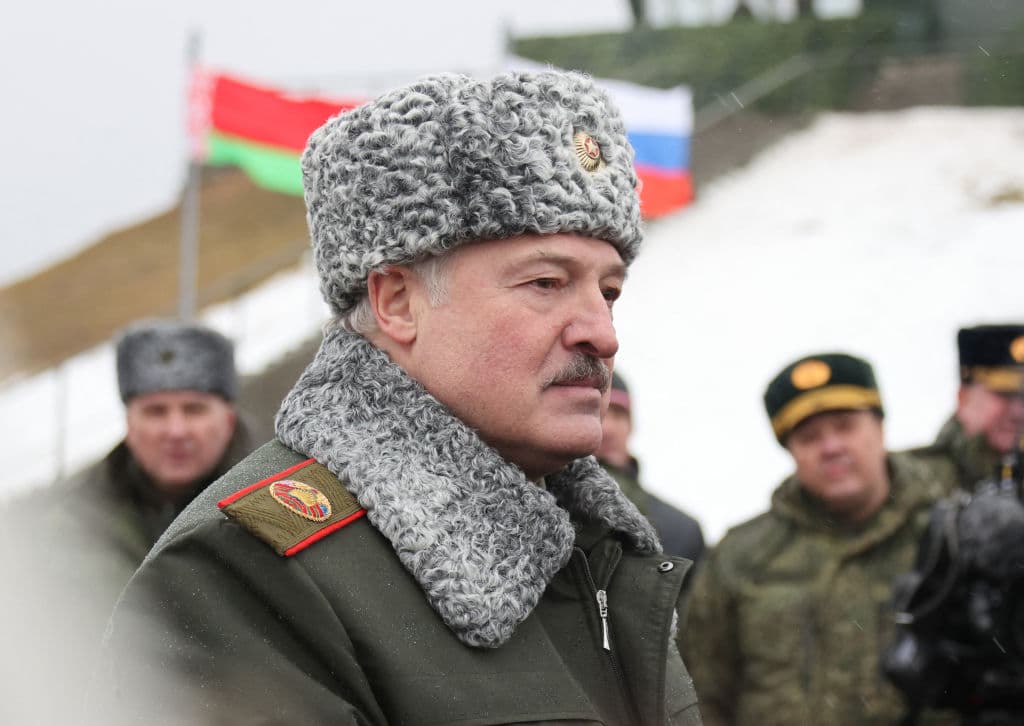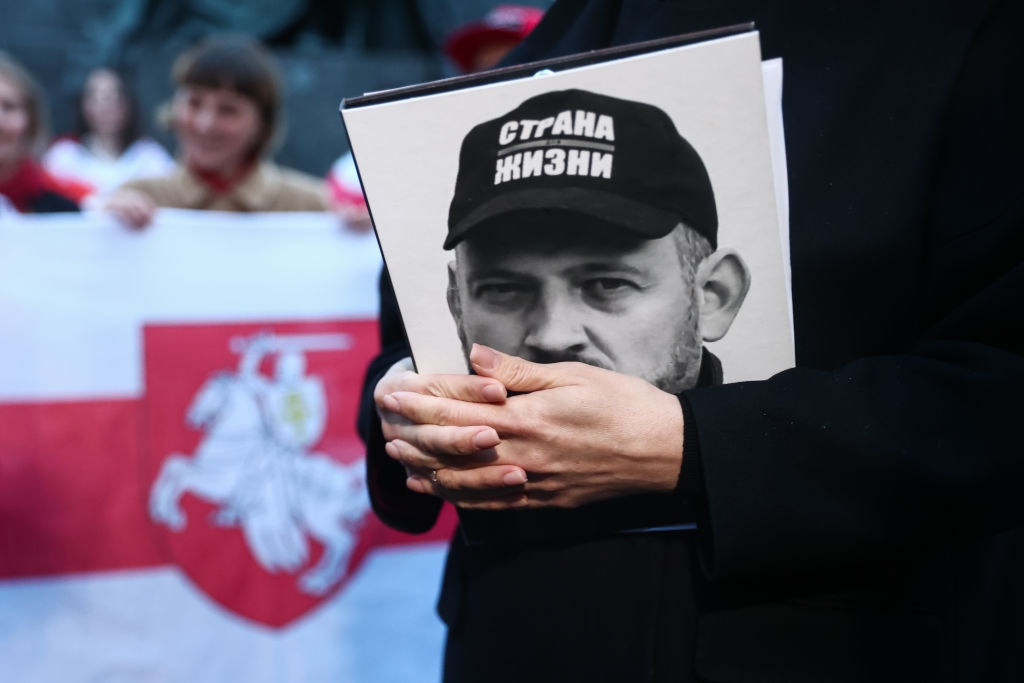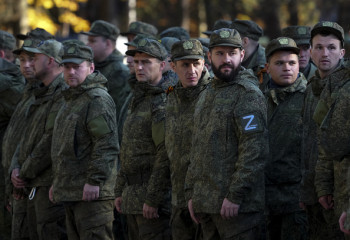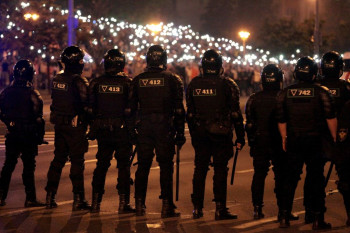Belarus Weekly: Lukashenko's regime bans 'Long live Belarus!' salute, adds 224 names to its list of 'extremists'

As military training grounds in Belarus expand after the creation of the Russia-Belarus joint military command force, Ukraine reports the deployment of kamikaze drones to a Belarusian airfield near the Ukrainian border.
Meanwhile, Belarusian dictator Alexander Lukashenko reiterates his intention not to send Belarusian forces to Ukraine.
After severing ties with Lukashenko’s regime, the Council of Europe held its first meeting with its Contact Group on Belarus alongside Belarusian opposition leader Sviatlana Tsikhanouskaya.
The last “tech unicorn” leaves Belarus amid the steady outflow of tech companies from the country.
Six co-defendants in the politically motivated case of Siarhei Tsikhanouski are to pay $8.7 million to “compensate” Belarusian law enforcement.
Belarus’ Interior Ministry also added 224 additional names to its list of alleged “extremists.”
Lukashenko's regime bans 'Long live Belarus!' salute, calls it Nazi
Belarusian authorities have recognized the country's patriotic motto "Long live Belarus!" and the answer to it "Long live!" as Nazi symbols.
The Belarusian Ministry of Internal Affairs on Nov. 10 officially included it into the list of Nazi symbols.
In 2020, Belarusian protesters who opposed the illegitimate regime of dictator Alexander Lukashenko used this salute widely. It is also used by members of the Belarusian democratic political forces, as well as members of the Belarusian diaspora.
Belarusians are now forbidden from shouting "Long live Belarus!" and answering "Long live!" accompanied by "raising the right hand with an outstretched palm" – which, in reality, people don't do when they say these words.
It is unclear whether the state considers the motto "Nazi" without raising the hand. It's also unclear if people can use another response to the salute, "Long live forever!"
In the decree, the authorities call the salute "a greeting of the 30th Waffen-SS division, which consisted mainly of former fighters of the Belarusian National Defense units."
According to the Belarusian bureau of Radio Liberty, Lukashenko's regime "has for many years been trying to... present the national symbols of Belarus – which appeared long before WWII – as Nazi symbols."
Satellite imagery: Russian troops amass at Belarusian military training grounds
According to satellite imagery from PlanetLabs, there has been a rise in the number of Russian troops stationed at Belarusian military training grounds since Oct. 10, when Lukashenko announced the Russia-Belarus joint regional military command.
Satellite imagery from Oct. 31 shows over 300 tents set up at three military training grounds in Belarus to serve as temporary housing for soldiers. The military training grounds include Abuz-Lyasnouski in western Belarus, Repishcha in central Belarus, and Lasvida in the country’s north.
Hundreds of pieces of military equipment have also arrived at the bases.
The number and size of tents reportedly suggest that a maximum of 7,500 troops could reside at the three military training grounds.
On Nov. 3, the U.K. Defense Ministry reported that Russia acquired at least 100 additional tanks and infantry fighting vehicles from Belarus, while Russian forces are losing about 40 armored vehicles per day in Ukraine.
Deputy Chief of Ukraine’s General Staff Oleksii Hromov said on Nov. 3 that, by stationing its forces in Belarus, Russia is trying to divert Ukraine’s attention and force it to move its soldiers away from the east and south where the country is conducting successful counteroffensive operations.
Hromov added that even if Russia decides to attack Ukraine from Belarus, drafted Russian recruits would first have to be trained, which would take at least two to three months.
Russia deploys Iranian drones to Belarus
Hromov said on Nov. 3 that Russia had deployed Iranian kamikaze drones to the Luninets military airfield in Belarus’ Brest region, close to the border with Ukraine.
However, Belarusian monitoring group Belarusian Hajun said it could not confirm the presence of Iranian-made drones at the airfield.
On Oct. 23, Ukraine’s National Resistance Center reported the presence of Iranian instructors in Russia to train Kremlin forces to use Iranian-made drones. The instructors were also reportedly spotted in Mikulichy, a village in Belarus’ Homiel region located near the Ukrainian border and the Chornobyl exclusion zone.
Lukashenko claims no intention of sending Belarusian troops to Ukraine
Lukashenko said on Nov. 4 that he has no intention of sending Belarusian forces to Ukraine.
In a statement on Nov. 4, the G7 foreign ministers called on Lukashenko’s regime to “stop enabling Russia’s war of aggression, including permitting Russia’s Armed Forces to use Belarusian territory to launch missiles targeting Ukraine.”
The statement noted that the G7 will impose “overwhelming additional costs on the regime” should Belarus become more directly involved in Russia’s full-scale war.
Lukashenko has previously acknowledged Belarus’ participation in Russia’s war.
“We’re not hiding it,” Lukashenko said on Oct. 4 of Belarus’ role. “But we are not killing anyone. We are not sending our military anywhere. We do not violate our obligations.”
Belarusian opposition leader Tsikhanouskaya said on Nov. 3 that Belarus sending its troops to Ukraine would mean “political suicide” for Lukashenko. “They will flee, surrender immediately,” Tsikhanouskaya said of the Belarusian military.
Council of Europe holds first meeting with Belarusian political opposition
The Council of Europe held its first meeting of the Contact Group on Belarus alongside Belarusian opposition leader Tsikhanouskaya on Nov. 7.
The meeting reportedly focused on the “priorities of the newly-established group on cooperation.”
“The Council of Europe stands on principle with the Belarus’ democratic forces and civil society,” said Council of Europe Secretary General Marija Buric.
The Council of Europe’s Committee of Ministers established a “Contact Group” on Sept. 7. It will hold regular exchanges with Tsikhanouskaya and other Belarusian democratic opposition forces and civil society.
On Mar. 17, the Committee of Ministers “suspended all relations” with Belarusian authorities due to its role as a co-belligerent in Russia’s full-scale war against Ukraine.
According to Tsikhanouskaya, the ultimate aim is for Belarus to join the Council of Europe once Lukashenko is ousted from power.
Last ‘tech unicorn’ leaves Belarus
American tech company WorkFusion, valued at over $1 billion, is shutting down its Minsk R&D office. WorkFusion is the last “tech unicorn” to have left Belarus.
In August, PandaDoc, a software company with Belarusian roots, also left after Belarusian authorities launched criminal proceedings against four of its employees. Several PandaDoc employees supported Belarusian protests following the fraudulent 2020 presidential election.
Flo, a medical startup with Belarusian roots valued at $800 million, relocated from Belarus in March.
In 2018, the tech industry accounted for 5.4% of Belarus’ GDP. The outflow of Belarusian entrepreneurs has risen following the 2020 presidential election and Russia’s full-scale invasion of Ukraine.
Meanwhile, over the past two years, Poland had issued over 58,000 visas for Belarusian tech professionals.

Sviatlana Tsikhanouskaya holds a photo of Siarhei Tsikhanouski photo during the meeting with Belarusians at the Main Square in Krakow, Poland on Oct. 2, 2022. (Getty Images)
Co-defendants in Tsikhanouski trial to pay over $8 million
Belarusian authorities have reportedly ordered six people sentenced to prison in the politically motivated case of Siarhei Tsikhanouski to pay $8.7 million in compensation.
Mikola Statkevich, Ihar Losik, Uladzimir Tsyhanovich, Artsiom Sakau, and Dzmitryi Papou were sentenced to 15 to 18 years of imprisonment alongside Tsikhanouski in 2020.
Tsikhanouski is the first of Lukashenko’s political opponents to have announced their intention to run for the presidency in 2020. He was detained in May 2020 and sentenced to 18 years in a penal colony.
His wife, Sviatlana Tsikhanouskaya, registered as a candidate to support her husband, who was arrested prior to the election.
Belarus cracks down on those supporting Ukraine, their families
Lukashenko’s regime has continued to persecute Belarusian volunteers fighting for Ukraine, and their families.
Belarusian authorities launched a criminal investigation against Vadzim Prakopyeu on Nov. 4, accusing him of allegedly having created an “extremist organization.”
Prakopyeu helps recruit and fund the Pahonya regiment, a Belarusian unit fighting as part of Ukraine’s military.
Belarusian authorities have persecuted the family members of a Belarusian volunteer that was killed while fighting in Ukraine’s military, Vasil Parfiankou.
Parfiankou’s cousin, Siarhei Bandarenka, was reportedly detained twice by Belarusian authorities, during which he was severely beaten and hospitalized. Bandarenka has since escaped to Poland. Parfiankou’s mother and sister were also detained by Belarusian authorities and later released.
Parfiankou is presumed to have been killed in action on June 26 near Lysychansk, Luhansk Oblast, although his body has not been found.
Around 1,500 Belarusian volunteers are fighting alongside Ukrainian forces against Russia. An estimated 15 volunteers have been killed.
Human rights watchdog: Belarus detains 114 political prisoners in October
Belarus launched a series of politically motivated criminal investigations in October, resulting in 114 people detained, Belarusian human rights watchdog Viasna reported.
According to Viasna, 99.13% of politically motivated convictions in Belarus result in detention, house arrest, or prison sentences.
For example, a businessman from Minsk received a 15-year prison sentence on Nov. 6 for participating in Telegram group chats containing rhetoric that opposed Lukashenko’s regime.
Meanwhile, Belarusian authorities detained an individual on Nov. 7 after allegedly having found the remnants of a Belarusian opposition sticker on their license plate. Belarusian authorities later published a video in which the individual is shown apologizing.
On Nov. 4, Belarus’ Interior Ministry added 244 names to its list of alleged “extremists.” In total, the list contains the names of 1,714 individuals.











